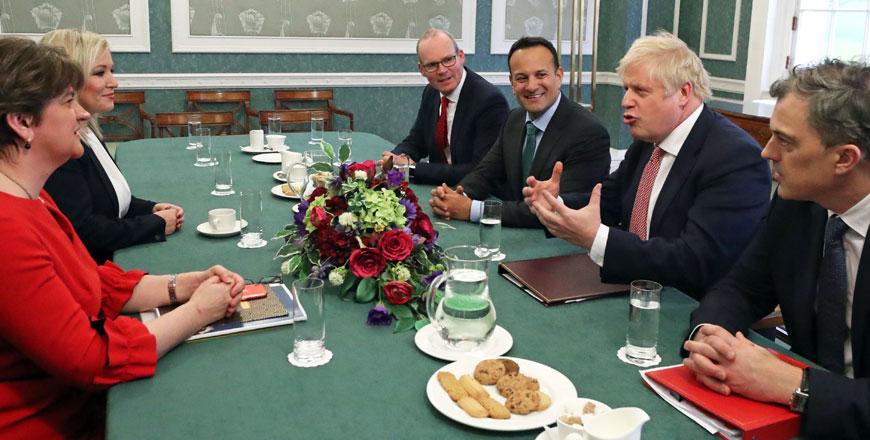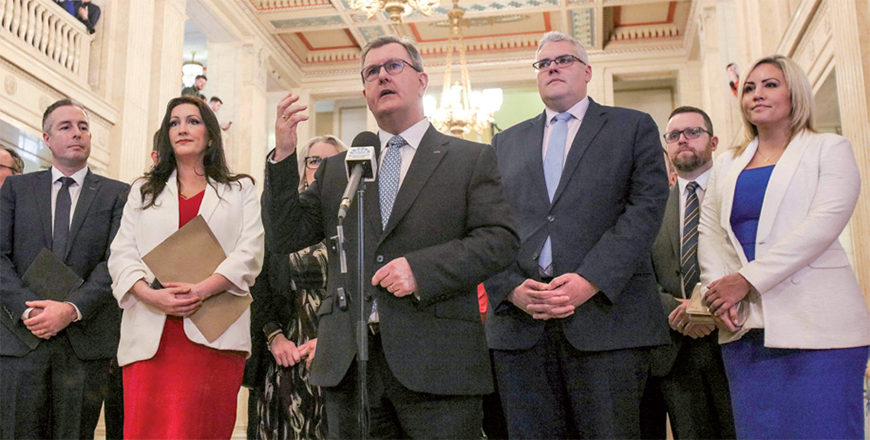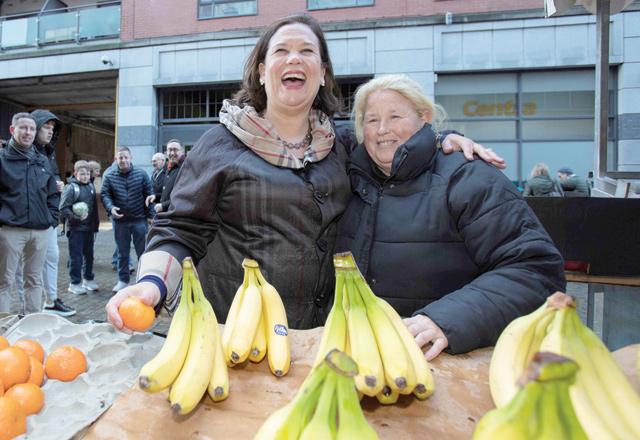You are here
Johnson hails Northern Ireland’s future after devolution restored
By AFP - Jan 13,2020 - Last updated at Jan 14,2020

Northern Ireland's First Minister Arlene Foster and Deputy First Minister Michelle O'Neill, Ireland's Foreign Minister Simon Coveney, Ireland's Prime Minister Leo Varadkar, Britain's Prime Minister Boris Johnson and Britain's Northern Ireland Secretary Julian Smith talk during their meeting at the parliament buildings, the seat of the Northern Ireland Assembly, on the Stormont Estate in Belfast, on Monday (AFP photo)
BELFAST — British Prime Minister Boris Johnson promised a "bright future" for Northern Ireland on Monday as he visited Belfast to mark the reopening of its power-sharing devolved government after a three-year hiatus.
The British province has been run by officials since the two main parties, the pro-London Democratic Unionists (DUP) and the republican Sinn Fein, fell out in January 2017.
The power vacuum came at a critical time, as Northern Ireland faces uncertainty over its relationship with London and Dublin following Britain's looming exit from the European Union.
"Never mind the hand of history on my shoulder... I see the hand of the future beckoning us all forward," Johnson told reporters after meeting assembly members.
"And I hope that with goodwill and compromise and hard work on all sides it will be a very bright future indeed."
At its reopening on Saturday, the assembly chose DUP leader Arlene Foster to be first minister and effective head of the government, while Sinn Fein's Michelle O'Neill was made her deputy.
After meeting them both, Johnson hailed Northern Ireland's politicians for having "put aside their differences, stepped up to the plate and shown leadership".
He said Northern Ireland was "a place of fantastic potential", and that the UK government would work with Belfast to ensure this was delivered.
Johnson did not confirm reports that London would be giving at least £2 billion (2.34 billion euros, $2.60 billion) to the province.
But he said a priority would be investing in the health service, which has been hit by a wave of nurses' strikes.
Brexit checks
Power-sharing was set up under the 1998 Good Friday agreement, which brought peace to Northern Ireland after decades of sectarian violence that killed thousands of people.
The devolved government collapsed in January 2017 over a scandal caused by the runaway costs of a renewable energy scheme championed by Foster.
After years of negotiations that led nowhere, the DUP and Sinn Fein last week approved an agreement drawn up by the British and Irish governments.
One factor in the breakthrough was the threat of elections if there was no deal.
In the UK-wide election last month, the DUP and Sinn Fein both lost votes to smaller parties, in part due to public frustration at the protracted stalemate.
The assembly will also have a future say over Brexit arrangements, which will see Northern Ireland take on a special trading status in order to avoid checks on its land border with EU member Ireland.
Johnson repeated Monday there was no need for checks on Northern Irish goods going to mainland Britain.
Equally, British goods going the other way would only be checked if they were destined for Ireland — and even then, only if London and Brussels failed to agree a free trade deal he was confident of getting later this year.
Legacy issues
Although both sides have endorsed the new deal, some elements may still yet prove controversial, notably the issue of the legacy of Northern Ireland's past.
The accord includes a commitment to uphold a 2014 deal setting up a historical investigations unit to investigate deaths during the so-called Troubles.
Some in London are worried about prosecutions against British soldiers deployed to the region, and Johnson's Conservatives have promised to end "vexacious" legal claims against the armed forces.
In Belfast, Johnson said there was "a balance between giving people who are in search of the truth the confidence that they need" and in giving veterans "the confidence and certainty that they need".
Negotiations to revive Stormont had also been stuck on the use of the Irish language and a mechanism giving parties veto rights.
The deal would now give the Irish language official recognition and it eliminates the veto mechanism.
Related Articles
BELFAST — Northern Ireland's lawmakers on Saturday restored its devolved assembly after a two-year hiatus, paving the way for a power-sharin
BELFAST — New Prime Minister Keir Starmer on Monday wrapped up a whistlestop tour of the UK, promising Northern Ireland's leaders "a differe
DUBLIN — Sinn Fein called on the European Union on Tuesday to back its bid for a united Ireland after a surge in support saw it become the s


















